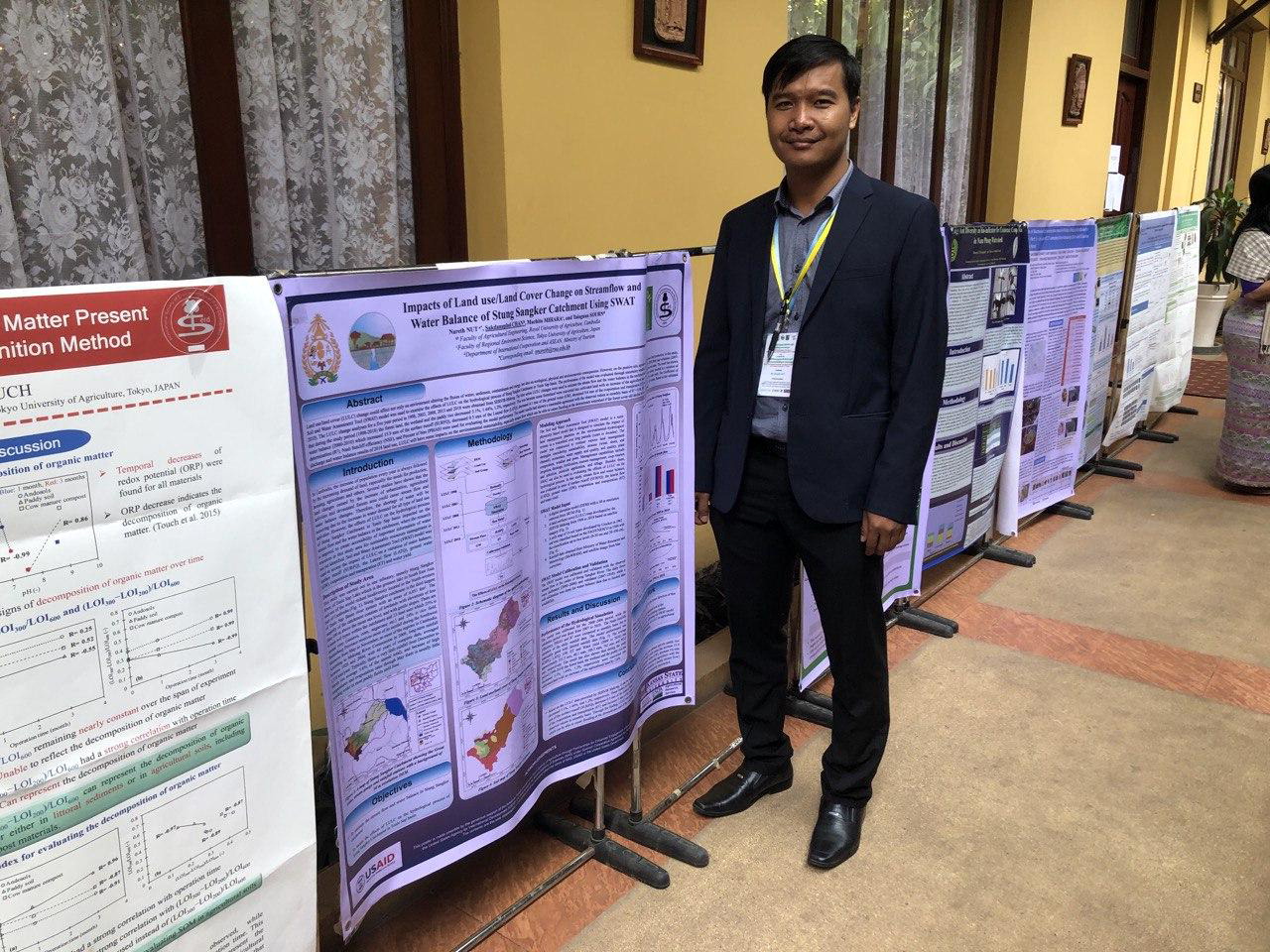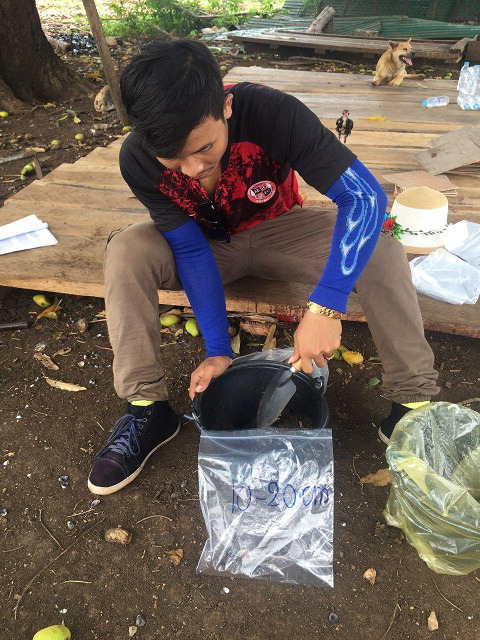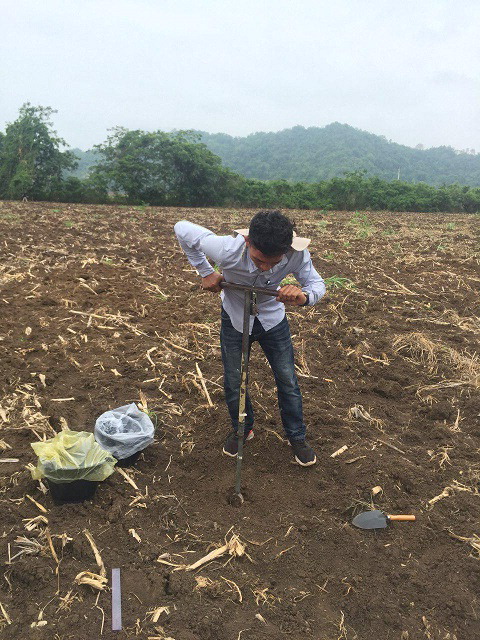Cycle 7 (2018 Deadline)
GIS-based weather, soils, land use, and agricultural management database in Cambodia
PI: Nareth Nut (nnareth@rua.edu.kh), Royal University of Agriculture
U.S. Partner: Gilbert Sigua, USDA Agriculture Research Service Coastal Plains Soil, Water, Plant Research Center
Dates: February 2019 - July 2021
Project Overview
Because several of Cambodia’s agricultural areas have degraded soils, the country is pursuing a sustainable agriculture approach aimed at growing food in a way that not only conserves the soil but also improves its quality. Working in partnership with U.S., French, and Brazilian researchers, local Cambodian scientists developed working technologies that enhanced soil quality and intensified production of upland grain, tuber, vegetable, forage, and lowland rice crops under conservation agriculture. The goal of the PEER-supported research project was to evaluate the capacity of the Soil and Water Assessment Tool (SWAT) to predict soil carbon sequestration in conservation agriculture production systems compared with traditional farming systems. Moreover, the project aimed at establishing a GIS-based weather, soil, land use, and agricultural management database that was housed in a central location for use as a baseline to help global users predict environmental degradation from current practices. SWAT was used as a reliable model for such simulations and to assess the environmental and economic benefits for Cambodia if sustainable intensification practices like conservation agriculture were promoted by the government and private industry. SWAT was based on the science behind the hydrologic cycle, nutrient cycle, carbon cycle, pesticide chemical degradation and movement, soil erosion processes, and crop growth and yield, combined as an integrated process. With support provided by PEER, Cambodian researchers collaborated with their U.S. partner to gather and format the inputs for SWAT simulation, including digital elevation maps and data on climate, soils, land use, crops, agricultural management, and types of fertilizers used. The results of the simulations were compared with measured data (where available) to assess the reasonableness of the simulations. Moreover, the U.S. partner provided technical expertise needed to accomplish critical objectives of the research project, as well as access to some equipment and laboratory instruments for analyses of water, soil, and plant samples. It was expected that the project could improve agricultural management practices in Cambodia, as well as provide synthesized data that could be useful globally. Capacity building for faculty members of the Royal University of Agriculture was improved through the training and implementation activities involved in the project. From the GIS-based digital data collected in this proposal, research could be conducted with quantified data using SWAT to analyze the impact of deforestation and agriculture on the Mekong River natural flows. In addition, different types of sustainable intensification production systems could be recommended from various scenarios, and environmental conservation could be simulated using SWAT. Predictions could be linked to food production, improved yield and income, and the capacity of the community to meet its food needs.
Final Summary of Project Activities
By the time this two-and-a-half year project ended in July 2021, the PI Mr. Nareth Nut reported many achievements, mainly in terms of capacity building to himself and his students on SWAT and APEX modeling and dissemination of the project results through various national and international conferences or meetings. Ten undergraduate students worked on the project and four graduate students (two males and two females) involved in the project successfully defended their theses in January 2021 under the PI’s supervision. One more Master’s student whose research focused on building a SWAT model of the Tonle Sap Basin was scheduled to defend his degree research in September 2021. Although the project has ended, the undergraduates continue to apply the SWAT and APEX models in the Tonle Sap Basin and other parts of Cambodia. Furthermore, the PI is currently a Ph.D. student at the Royal University of Agriculture and he will integrate the SWAT application in his dissertation.
As part of their efforts to scale up the concept of modeling (SWAT and APEX) to compare and predict the environmental impacts of two management practices (traditional farming and conservation agriculture in Cambodia), the PI teamed up with other universities, government agencies, and international development organizations, including Kansas State University (KSU), the French Agricultural Research Centre for International Development (CIRAD), Swisscontact, the Swiss Federal Institute of Aquatic Science and Technology (Eawag), the Institute of Technology of Cambodia (ITC), University of Battambang (UBB), and French National Research Institute for Sustainable Development (IRD) to prepare a concept note to submit for further funding. They submitted a pre-proposal in response to a call from a Swiss-supported grants program called TRANSFORM. Although the pre-proposal was among the 9 of 90 selected to advance to the full proposal stage, the project was not funded. The various partners involved remain in contact to seek alternative funding sources.
In terms of research findings, the PEER team found that there is a high risk of soil erosion mainly in the agricultural field due to the transformation of forests to agricultural lands, as detailed in their 2021 article. Currently, some conservation agriculture (CA) activities are being implemented in the study area by CIRAD in cooperation with the Conservation Agriculture Service Center (CASC), Ministry of Agriculture, Forestry, and Fisheries. However, these activities mainly focus on analyzing the soil properties changed due to CA implementation in the field plots of the experiment station. Thus, application of the PEER team’s modeling-based approaches to predict the impacts and outcomes of various approaches will be useful for policymakers in considering the direction of agricultural development in Cambodia. Although the PEER project has ended, Mr. Nut and his group plan to compare the impacts of soil erosion risk between traditional agriculture and CA and use their findings to inform policymakers and train agricultural extension workers and producers to promote soil conservation practices. Mr. Nut continues to collaborate with his U.S. partner Dr. Gilbert Sigua on development of future manuscripts and formulation of new research projects.
Publications
Nut, N.; Mihara, M.; Jeong, J.; Ngo, B.; Sigua, G.; Prasad, P.V.V.; Reyes, M.R. 2021. Land Use and Land Cover Changes and Its Impact on Soil Erosion in Stung Sangkae Catchment of Cambodia. Sustainability 2021, 13, 9276. https://doi.org/10.3390/su13169276
Nut, N.; Mihara, M.; Jeong, J.; Ngo, B.; Chan, S.; Sigua, G.; Reyes, M.R. (in press, 2022) Impacts of Land Use-Land Cover Changes on Streamflow and Water Balance of Stung Sangkae Catchment Using SWAT. International Journal of Environment and Rural Development, 12 (2). (Accepted and awaiting online publication at https://www.iserd.net/)
Nut, N.; Reyes, M.R.; Sigua, G.; Chan, S.; Mihara, M.; Sourn, T. (in press, 2022) Application of APEX Model in Evaluating Streamflow and Sediment Yield in Stung Chinit Catchment. International Journal of Environment and Rural Development, 12 (2). (Accepted and awaiting online publication at https://www.iserd.net/)
Information on the PEER-funded project has been shared with the USDA National Agricultural Library (https://www.nal.usda.gov/fsrio/research-projects/gis-based-weather-soils-land-use-and-agriculturalmanagement-database-cambodia). The posters and research articles from the project are shared via ResearchGate (https://www.researchgate.net/project/GIS-Based-Weather-Soils-Land-Use-and-Agricultural-Management-Database-in-Cambodia). Some datasets of PEER results are available on the Royal University of Agriculture's website at http://www.rua.edu.kh/index.php/view_facaultys/2186345186480/116822557600/1080057608 and additional data will be added after some revisions in the website are complete.
Back to PEER Cycle 7 Grant Recipients
|






